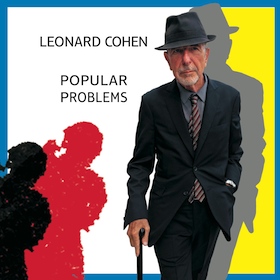Leonard Cohen 'Popular Problems' Review: Cohen Blends Genres Seamlessly Yet Again

4.5/5
It’s unfortunate to admit that Popular Problems is likely Leonard Cohen’s swan song. You can’t help but avoid the idea because he’s put out three albums over the last four years and he’s just come off of a world tour. At the same time, he’s 80 and undeniably frail. At nine songs combining to thirty-six minutes, this album is a brief one, but that should not be considered as indicative of the quality.
Cohen has always been more of a poet than a singer; he’s also referred to some of his songs as personal prayers. Over the years Cohen has moved back and forth over the spoken-word line, particularly in the elegiac and moving rendition of “A Thousand Kisses Deep” from his Live in London album in 2010. Popular Problems is the most spoken-word of any of his albums, relying mostly on his backup singers, while Cohen only adds to the melody in certain places, preferring to cover the lines through his usual deep timbre.
Most of the songs here are originals, though versions of “Nevermind,” “A Street” and “My Oh My” have popped up in live performances and small gatherings before being altered for this studio release. Cohen strains during some of these songs, as if he struggles to gather the breaths necessary to question "Did I ever love you," and perhaps that in itself is its own little tragedy.
Musically, Cohen focuses on his love of genre blending — melding gospel, pop, jazz, folk, blues, synthesized tones and indie sounds into a mélange, while focusing on the usual common themes of love and sex, nostalgia, religion and depression. Some of his later work, presented clearly here in “A Street,” is about acceptance. Acceptance of the changes that come in age, with the paths taken and choices made. So much of the album can be discarded almost as a greatest hits, as it covers so much of the common Cohen ground. But time and age has altered Cohen who, over decades, has moved from distant observer to youthful idealism and exploration to middle-aged regret and cynicism, and finally, in a last configuration, to elderly wistfulness and acceptance.
In that way, the album is more relaxed, and somewhat playful. There is an undeniable feeling of recollection that is different from nostalgia. It’s reflective and matter of fact, though not as distant in emotion as I’m making it seem. Over the years, Cohen has played around with toneless evocation, asking his audience to place the emotion ourselves, inside chambers personal and nameless and unique to ourselves, allowing us to imprint what burns in our hearts onto the canvas Cohen presents.
He’s not for everyone. I’m not saying this out of some kind of arrogant “You just don’t get it, man” way. There are songs or even entire albums of Cohen’s that I just can’t stand. He has his hits and misses, and the problem with experimentation is that the results can be amazing and then failing — utterly unpredictably. As I said, Cohen has always been more of a poet, and sometimes his spoken-word tendencies do not quite mesh with the music and end up overtaking the music and making it little more than background, which is unfortunate because both can be enjoyed separately or together, and we would prefer together.
Arrangement-wise, Cohen’s people are always quite clever. While there are only nine songs, they cover a multitude of genres, and they mix seamlessly into the other. Popular Problems is a rather strategic album. It covers the most popular of Cohen’s themes and shows off the trademark genre-mixing his music is known for. It’s a best-hits album with new songs. In that way it’s a nice bow to a long and underestimated career.
RELATED ARTICLES
Get the most-revealing celebrity conversations with the uInterview podcast!







Leave a comment